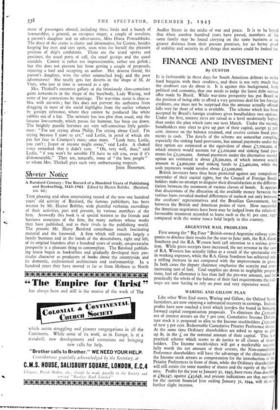FINANCE AND INVESTMENT
By CUSTOS
IT is fashionable in these days for South American debtors to strike hard bargains with their creditors, and there is not very much that the creditors can do about it. It is against this background, both political and economic, that one needs to judge the latest debt service offer made by Brazil. While war-time prosperity has put Brazil in the position of being able to afford a very generous deal for her foreign creditors, one must not be surprised that the amount actually offered falls very far short of what is available. The scheme which has been accepted by Brazil's foreign creditors gives bondholders two options. Under the first, interest rates are raised to a level moderately higher than under the plan which runs out next March. Under the second, bondholders may elect to give up part of their capital, accept 37: per cent. interest on the balance retained, and receive certain fixed pay- ments in cash. The details of the scheme are somewhat complex, especially the sinking fund provisions, but annual payments under the first option are estimated at the equivalent of about £7,700,000, of which interest would account for £5,200,000 and sinking fund pay- ments for £2,500,000. Annual payments under the alternative second option are estimated at about £8,300,000, of which interest would amount to £4,900,000 and sinking funds to £3,400,000, while the cash payments would involve about £23,000,000.
British investors have thus been protected against any compulsory surrender of their capital rights, but the Council of Foreign Bond- holders make no attempt to disguise their dissatisfaction at the differen- tiation between the treatment of various classes of bonds. It appears that discussions of the allocation of, the available money between the various loans revealed marked differences of outlook not only between the creditors' representatives and the Brazilian Government, but between the British and American points of view. How successful the American negotiators have been may be judged from the relatively favourable treatment accorded to loans such as the 6 per cent. 1927 compared with the senior issues held largely in this country.
ARGENTINE RAIL PROBLEMS First among the " Big Four " British-owned Argentine railway com- panies to disclose their results for the year to June 30th, the B.A. Great Southern and the B.A. Western both call attention to a serious posi- tion. While gross receipts have increased, the net revenue in the case of B.A. Western has actually fallen as a result of the spectacular rise in working expenses, while the B.A. Great Southern has achieved only a trifling increase in net compared with the improvement in gross. In both cases the deputy chairmen emphasise the scarcity and ever- increasing cost of fuel. Coal supplies are down to negligible propor- tions, fuel oil allowance is less than half the pre-war amount, and for practically the whole of the balance of their fuel requirements the rail- ways are now having to rely on poor and very expensive wood.
WARING AND GILLOW PLAN
Like other West End stores, Waring and Gillow, the Oxford Street furnishers, are now enjoying a substantial recovery in earnings. Indeed, profits have now reached a level which juste es the board in bringing forward capital reorganisation proposals. To eliminate the £120,000 net of interest arrears on the 7 per cent. Cumulative Income Deben- ture stock it is proposed to allot to the Income stockholders £120,000 of new 5 per cent. Redeemable Cumulative Priority Preference shares. At the same time Ordinary shareholders are asked to agree to give up 8s. in the £ on the nominal amount of their capital. This is a practical scheme which seems to do justice to all classes of share- holders. The Income stockholders will get a marketable security fully worth the net amount of their arrears, the Non-cumulative Preference shareholders will have the advantage of the elimination of the Income stock arrears as compensation for the introduction of the Priority Preferences in front of them, while the Ordinary shareholders will still retain the same number of shares and the equity of the busi- ness. Profiti for the year to January 31, 1943, have more than doubled at £89,547, against £43,648, and present indications are that earnings for the current financial 'year ending January 31, 1944, will show s further slight increase.


























 Previous page
Previous page